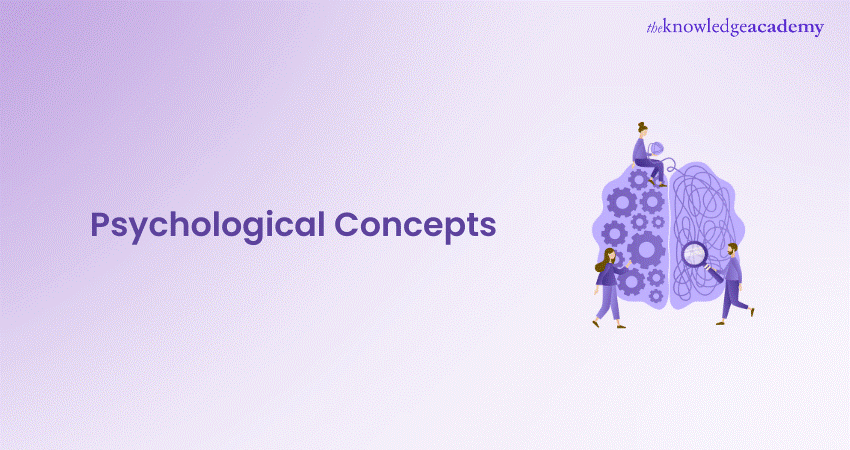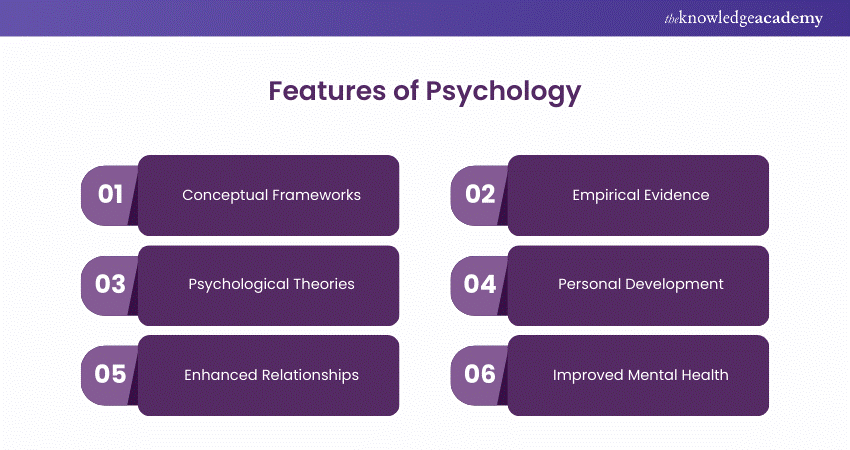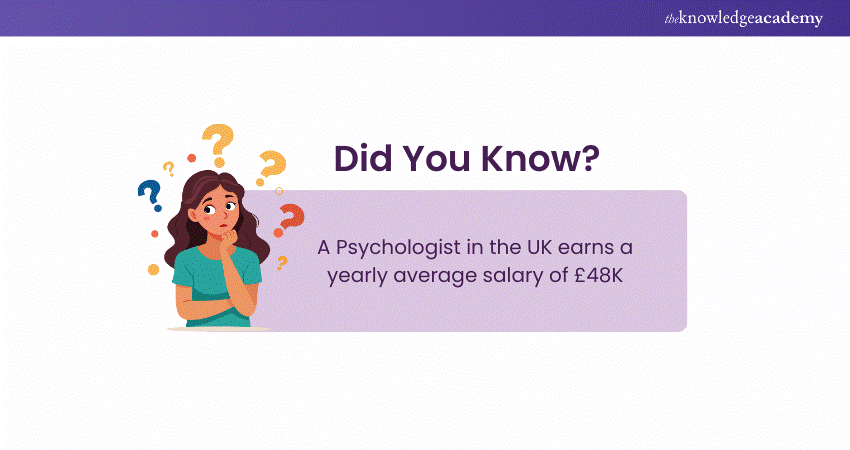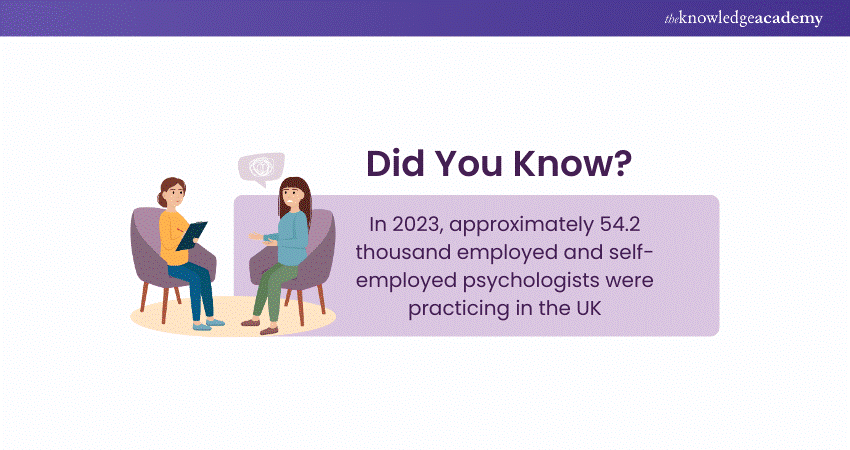We may not have the course you’re looking for. If you enquire or give us a call on 01344203999 and speak to our training experts, we may still be able to help with your training requirements.
We ensure quality, budget-alignment, and timely delivery by our expert instructors.

Ever wonder what makes us love, hate or lay in our beds overthinking at 2 AM? What exactly are the mechanics behind the relentless flow of emotions that makes us tick as people? Psychology holds all the answers. This field takes us on a journey to the world within, decoding the mysteries behind human thoughts and behaviours.
This blog unpacks the most prominent Psychological Concepts created and refined by experts, which help us delve into the depths of the human psyche with unprecedented precision. So, read on and gear up for an unforgettable journey into what makes us, us!
Table of Contents
1) What is Psychology?
2) Exploring Five Concepts of Psychology
a) Biological Concept
b) Psychodynamic Concept
c) Behavioural Concept
d) Cognitive Concept
e) Humanistic Concept
3) Conclusion
What is Psychology?
Psychology is an intriguing field of study in the field of science. It takes researchers into deep introspection of human mind and behavioural science. It provides commendable insights, theories, and facts into the Psychological Concepts, which contribute significantly. Additionally, understanding the Features of Science in Psychology bridges the knowledge gap in comprehending human cognition, emotions, and actions, offering a deeper look into the complexities of the human mind.
These concepts are derived from empirical evidence, gathered through scientific studies and experiments. They offer valuable insights into the underlying mechanisms of human behaviour, helping us make sense of the complexities of the mind.

A comprehensive understanding of Psychology concepts equips individuals with invaluable psychological tools for navigating the complexities of human nature. These concepts can be applied to personal development, relationships, and even mental health.
Psychology comprises the following key features:
a) Conceptual Frameworks: Psychology offers conceptual frameworks that help organise and understand human behaviour.
b) Empirical Evidence: Psychology is rooted in empirical evidence derived from scientific studies and experiments.
c) Psychological Theories: It encompasses a range of Psychological Theories that provide comprehensive explanations for various phenomena.
d) Personal Development: Applying Psychology Concepts can contribute to personal growth, self-awareness, and resilience.
e) Enhanced Relationships: Psychology concepts improve communication, empathy, and understanding in relationships.
f) Improved Mental Health: Psychology concepts promote mental well-being and provide strategies for stress management and emotional well-being.

Exploring Five Concepts of Psychology
Psychology is the scientific study of the mind and behaviour, but there is no one right way to explain why people think, feel, and act the way they do. Different perspectives or approaches in Psychology offer different ways to understand human behaviour and mental processes.
The five significant concepts in Psychology are Biological, Psychodynamic, Behavioural, Cognitive, and Humanistic. Each perspective has its assumptions, methods, and applications, but they also complement and contrast each other in various ways. If you are preparing for a psychology-related role, you might encounter Psychology Interview Questions that assess your understanding of these concepts and how you apply them in real-world scenarios. Let’s explore these concepts in detail:
1) Biological Concepts
The biological concept in Psychology is a perspective that focuses on the physical basis of behaviour and mental processes. Ways of Studying the Brain Psychology involve using scientific methods, such as experiments, brain scans, and genetic analysis, to investigate how the activity of the brain, nervous system, hormones, and genes can explain all psychological phenomena. This approach explores how these biological factors influence human thoughts, feelings, and actions.
The Biological Concept also considers how evolution and natural selection have shaped human behaviour and traits over time. Some of the topics that it covers are:
a) How brain structures and functions affect perception, memory, emotion, language, and cognition.
b) How hormones and neurotransmitters regulate mood, stress, motivation, and behaviour.
c) How genetic variations and inheritance influence personality, intelligence, mental disorders, and diseases.
d) How environmental factors, such as drugs, diet, and toxins, interact with the biological system and affect behaviour and health.
This concept has many strengths and weaknesses. Some of the strengths are:
a) It's Objective
b) It's Empirical
c) It's Testable
d) It provides a basis for understanding the link between mind and body
e) It offers a basis for developing treatments for psychological problems
Some of the weaknesses are:
a) It is reductionist
b) It's deterministic
c) It ignores the role of cultural and social factors in Psychology
2) Psychodynamic Concept
The Psychodynamic Concept in Psychology is a perspective that focuses on the unconscious forces and conflicts that shape human behaviour and personality. It is based on the theories of Sigmund Freud, who proposed that our childhood experiences, instincts, and desires influence our thoughts, feelings, and actions, often without our awareness. It uses methods such as case studies, dream analysis, free association, and projective tests to explore the hidden aspects of the mind and the reasons behind our behaviour.
The Psychodynamic Concept also considers how defence mechanisms, such as repression, denial, and projection, protect us from anxiety and guilt. It has contributed to the understanding of personality development, mental disorders, and Psychotherapy. However, it has also been criticised for being unfalsifiable, subjective, and lacking empirical evidence.
3) Behavioural Concept
The Behavioural Concept in Psychology is a perspective that focuses on the observable actions and reactions of humans and animals. It assumes that all behaviours are learned through interaction with the environment and that they can be modified by changing the stimuli or the consequences.
The Behavioural Concept uses scientific methods, such as experiments and observation, to measure and analyse behaviour objectively. It also considers how reinforcement and punishment influence behaviour and how learning can occur through imitation and modelling. Some of the topics that the behavioural concept studies are:
a) Classical conditioning that explains how we learn to associate stimuli and responses.
b) Operant conditioning that explains how we learn to perform behaviours based on their outcomes.
c) Social learning theory which explains how we learn from observing others.
The strengths of the behavioural concept are:
a) It is based on empirical evidence
b) It has practical applications
c) It can explain a wide range of human behaviours
Some of its weaknesses are:
a) It ignores mental processes
b) It is too simplistic
c) It does not account for individual differences

4) Cognitive Concept
The cognitive concept in Psychology is a perspective that emphasises the mental processes that underlie human behaviour and cognition. It assumes that people are active and rational agents who use information from the environment and their knowledge to make sense of the world.
This concept uses scientific methods, such as experiments, surveys, and computer simulations, to investigate how people perceive, remember, learn, think, communicate, and solve problems. Additionally it considers how individual differences, such as intelligence, personality, and culture, affect cognitive performance.
Some of the topics that the Cognitive Concept studies are:
a) How attention, perception, and memory work together to process sensory information and store it for later use.
b) How language and communication enable people to express their thoughts and understand others.
c) How reasoning, judgment, and decision-making involve using logic, heuristics, and biases to draw conclusions and choose actions.
d) How problem-solving and creativity involve using strategies, algorithms, and insight to find solutions and generate new ideas.
e) How metacognition and self-regulation involve monitoring and controlling one’s cognitive processes and behaviours.
The cognitive concept has many strengths and weaknesses. Some of the strengths are:
a) It's based on empirical evidence
b) It has practical applications
c) It can explain a wide range of cognitive phenomena
Some of the weaknesses are:
a) It ignores emotional and motivational factors
b) It is too abstract and complex
c) It doesn't account for social and cultural influences on cognition
5) Humanistic Concept
The humanistic concept in Psychology is a perspective that focuses on the whole person and their potential for growth, self-actualisation, and free will. It assumes that people are innately good and motivated to achieve their goals, values, and meaning in life.
This concept uses qualitative methods, such as case studies and interviews, to explore the subjective experience of individuals. The Humanistic Concept also considers how self-esteem and self-fulfilment affect psychological well-being.
The humanistic concept explores how:
a) Humanism differs from behaviourism and psychoanalysis, which are seen as dehumanising and deterministic.
b) Maslow’s hierarchy of needs explains the stages of human development and the ultimate goal of self-actualisation.
c) Rogers’ theory of personality and therapy emphasises the importance of unconditional positive regard, unity, and empathy in fostering a healthy self-concept.
The humanistic concept comes with many strengths and weaknesses. Its strengths are that it is:
a) Optimistic
b) Holistic
c) Individualistic
d) Provides a basis for understanding human motivation and values
Some of its weaknesses are that it is:
a) Subjective
b) Unscientific
c) Unrealistic
d) Ignores the role of social and biological factors in Psychology
Conclusion
In conclusion, the broad range of Psychology Facts and concepts helps us unravel the complexities of human behaviour and cognition. By studying topics such as research designs, the nature vs nurture debate, states of consciousness, memory, and cognitive development, individuals can better understand the mind's intricate workings. This knowledge fosters personal growth, nurtures healthier relationships and ensures long-term mental well-being.
Learn about the various theoretical perspectives on personality, by signing up Introduction to Psychology of Personality Course now!
Frequently Asked Questions
How do You Study Psychology Concepts?

Here are some tips to help you grasp Psychology:
a) Learning psychology can become easy and productive if you pen down your notes.
b) Schedule your study time by segmenting the course.
c) Create a mind map to simplify the learning process
d) Take practice quizzes or tests
e) Explore real-world examples
f) Study the toughest topic first
What is the Hardest Theory in Psychology?

Schema theory is considered the most complex theory in psychology. Its central claim is that our knowledge of the world is organised and categorised, which can impact our cognition and behaviour.
What are the Other Resources and Offers Provided by The Knowledge Academy?

The Knowledge Academy takes global learning to new heights, offering over 3,000 online courses across 490+ locations in 190+ countries. This expansive reach ensures accessibility and convenience for learners worldwide.
Alongside our diverse Online Course Catalogue, encompassing 19 major categories, we go the extra mile by providing a plethora of free educational Online Resources like News updates, Blogs, videos, webinars, and interview questions. Tailoring learning experiences further, professionals can maximise value with customisable Course Bundles of TKA.
What is The Knowledge Pass, and How Does it Work?

The Knowledge Academy’s Knowledge Pass, a prepaid voucher, adds another layer of flexibility, allowing course bookings over a 12-month period. Join us on a journey where education knows no bounds.
What are the Related Courses and Blogs Provided by The Knowledge Academy?

The Knowledge Academy offers various Mental Health Courses, including the Mental Health and Wellbeing Training and the Mental Capacity Course. These courses cater to different skill levels, providing comprehensive insights into Evolutionary Psychology.
Our Health & Safety Blogs cover a range of topics related to Psychology, offering valuable resources, best practices, and industry insights. Whether you are a beginner or looking to advance your Psychology expertise, The Knowledge Academy's diverse courses and informative blogs have got you covered.
Upcoming Health & Safety Resources Batches & Dates
Date
 Psychology Course
Psychology Course
Fri 13th Jun 2025
Fri 15th Aug 2025
Fri 10th Oct 2025
Fri 12th Dec 2025






 Top Rated Course
Top Rated Course



 If you wish to make any changes to your course, please
If you wish to make any changes to your course, please


